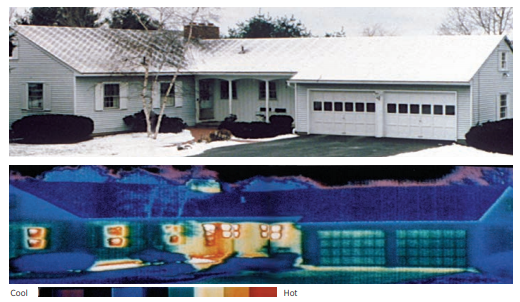Your Whole-House Plan

Heat Loss from a House
A picture is worth…in this case, lost heating dollars. This thermal image-taken by a professional energy auditor-shows warm air escaping through windows and cracks. The red shows where the most warm air is escaping.After you know where your home is losing energy, make a plan by asking yourself a few questions:
- How much money do you spend on energy?
- Where are your greatest energy losses?
- How long will it take for an investment in energy efficiency to pay for itself in energy cost savings?
- Do the energy-saving measures provide additional benefits that are important to you-for example, increased comfort from installing double-paned, efficient windows?
- How long do you plan to own your current home?
- Can you do the job yourself or do you need a contractor?
- What is your budget?
- How much time do you have for maintenance and repairs?
Planning smart purchases and home improvements will maximize your energy efficiency and save you the most money.
A more advanced alternative to performing a DIY energy assessment is to get advice from your state energy office, utility, or an independent energy auditor (see References for professional organizations). A professional energy auditor uses special test equipment to find air leaks, areas lacking insulation, and malfunctioning equipment. The auditor analyzes how well your home's energy systems work together, and compares the analysis to your utility bills. After gathering information about your home, the auditor will recommend cost-effective energy improvements that enhance comfort and safety. Some will also estimate how soon your investment in efficiency upgrades will pay off.